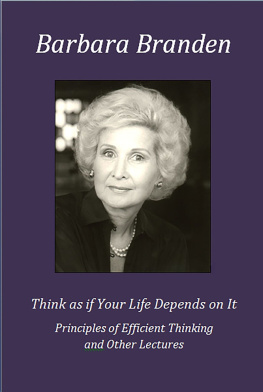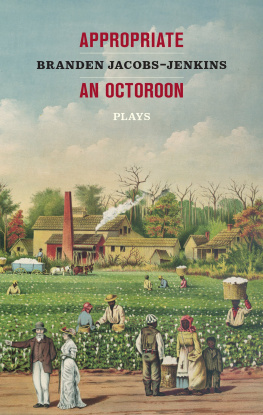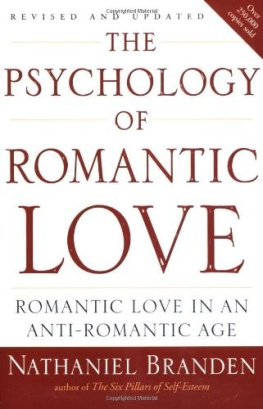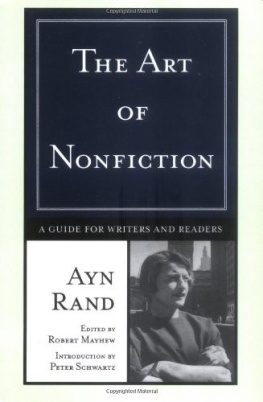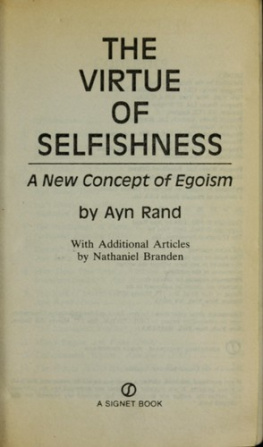Barbara Branden - The Passion of Ayn Rand
Here you can read online Barbara Branden - The Passion of Ayn Rand full text of the book (entire story) in english for free. Download pdf and epub, get meaning, cover and reviews about this ebook. genre: Non-fiction. Description of the work, (preface) as well as reviews are available. Best literature library LitArk.com created for fans of good reading and offers a wide selection of genres:
Romance novel
Science fiction
Adventure
Detective
Science
History
Home and family
Prose
Art
Politics
Computer
Non-fiction
Religion
Business
Children
Humor
Choose a favorite category and find really read worthwhile books. Enjoy immersion in the world of imagination, feel the emotions of the characters or learn something new for yourself, make an fascinating discovery.

- Book:The Passion of Ayn Rand
- Author:
- Genre:
- Rating:5 / 5
- Favourites:Add to favourites
- Your mark:
- 100
- 1
- 2
- 3
- 4
- 5
The Passion of Ayn Rand: summary, description and annotation
We offer to read an annotation, description, summary or preface (depends on what the author of the book "The Passion of Ayn Rand" wrote himself). If you haven't found the necessary information about the book — write in the comments, we will try to find it.
The Passion of Ayn Rand — read online for free the complete book (whole text) full work
Below is the text of the book, divided by pages. System saving the place of the last page read, allows you to conveniently read the book "The Passion of Ayn Rand" online for free, without having to search again every time where you left off. Put a bookmark, and you can go to the page where you finished reading at any time.
Font size:
Interval:
Bookmark:
Barbara Branden
The passion of Ayn Rand
Introduction
The life of Ayn Rand was the material of fiction. But if one attempted to write it as a novel, the result would be preposterously unbelievable. Everything about her life and her person was of an epic scale. Her seventy-seven years encompassed the outer limits of triumph and defeat, of exaltation and tragedy, of passionate love and intransigent hatred, of dedicated effort and despairing passivity. Her person encompassed the grandeur of the heroes of her novels, their iron determination, their vast powers of intellect and imagination, their impassioned pursuit of their goals, their worship of achievement, their courage, their pride, and their love of life as well as the terrors, the self-doubts, the lack of emotional balance, the private agonies that are so alien to an Ayn Rand hero. Her virtues were larger than life and so were her shortcomings.
Few figures in this century have been so admired and so savagely attacked. She is viewed as goddess and as malefactor, as a seminal genius and an ominously dangerous corrupter of the young, as the mightiest of voices for reason and the destroyer of traditional values, as the espouser of joy and the exponent of mindless greed, as the great defender of freedom and the introducer of malevolent values into the mainstream of American thought. It is all but impossible to find a neutral voice among the millions who have read her works; each reader takes an unequivocal stand for or against that which she represents. When her name is mentioned in any gathering, it is met with explosions of grateful, loving admiration or enraged disapproval. In the course of conducting more than two hundred interviews with people whose lives were touched by her or by her work, I have yet to encounter a single person who spoke of her with indifference.
Yet despite the furor her ideas have generated despite the fact that they fill the pages of thirteen books, which, as of this writing, have sold more than twenty million copies despite the fact that her philosophy has had a powerful and still-accelerating influence on the culture in which we live little is known about the human being who was Ayn Rand. Still less is known about the woman who was Ayn Rand. Her public and professional activities took place on a lighted stage; her private life was lived backstage, curtained from view.
I first met Ayn Rand in 1950. At the age of forty-five, she had already achieved a singular renown as the author of The Fountainhead and was writing her magnum opus, Atlas Shrugged the work that was to skyrocket her to international fame and place her in the center of a hurricane of controversy. I was attending UCLA with my friend and later my husband, Nathaniel Branden. I was majoring in philosophy, he in psychology. We both had read The Fountainhead and then We the Living and Anthem, Ayn Rand's two earlier novels and we deeply admired and were influenced by her work. Learning that she was living in Southern California, Nathaniel wrote her a letter, asking philosophical questions about The Fountainhead and We the Living. Impressed with his questions, she arranged to meet with him; a week later, I joined them for a second meeting.
It was the beginning of an intimate friendship with Ayn and her husband, Frank O'Connor, lasting across nineteen years, during which we met with Ayn or spoke with her by telephone almost every day; for a number of years, we lived in the same New York apartment building. I was engaged in the passions and pains of Ayn's life, first as her student and later as a teacher of her philosophy. We became privy to each other's personal and professional lives, to each other's joys and sorrows, triumphs and defeats. It was the beginning of the endless captivation of observing at close hand the unfolding of a great and growing literary and philosophical talent, of a mind of towering intellectual power, of a tormented, passionate, searching spirit. It was the beginning of years filled with wonder, with excitement, with exaltation and with suffering and tragedy and heartbreak.
I shall not forget my first impression of Ayn Rand. When the door to her home opened that spring evening in 1950, I found myself facing the most astonishing human being I had ever encountered. It was the eyes. The eyes were dark, too large for the face, fringed with dark lashes, alive with an intensity of intelligence I had never imagined human eyes could hold. They seemed the eyes of a human being who was composed of the power of sight.
As the years passed, I was to observe all the many changes of expression of those incredible eyes. I saw them ferocious with concentration on a new idea or question that had not occurred to her before, or on a difficult passage in Atlas Shrugged, with a single-minded intensity that seemed as if it might set fire to the person or page she was addressing. I saw them cold, so icily, inhumanly cold that they froze one's heart and mind. I saw them radiant with the uninhibited delight of a child I saw them menacing with anger at any hint of what she considered the irrational in human action I saw them helpless and womanly when she gazed at her husband I saw them bitter, resentful, and full of pain I saw them glow with the special, earnest charm that was uniquely hers, and that no one who met her was immune to I saw them pulled tight with loathing, wild with uncontrollable rage I saw them kind, touchingly kind, tender with the desire to help and to protect I saw the merciless, accusing eyes of the moralist, judging, condemning, unforgiving, the power of her reason becoming a whip to scourge the heretic I saw them shyly solemn like a young girl when a boy, my husband, took her hand. But I never saw those eyes without the light of a vast, consuming intelligence, the light of a ruthless intellect that was at once cold and passionate; this was the core of her life, the motor of her soul.
There was something I never saw in Ayn Rand's eyes. They never held an inward look a look of turning inside to learn ones own spirit and consciousness. They gazed only and always outward. It was many years before I was to understand the absence of that inward look, and what it revealed. It was to require all the knowledge of all the years to understand it.
To this day, when I think of Ayn Rand, I see her eyes. They haunted me through nineteen years. Perhaps they haunt me still.
Nathaniel and I were twenty-five years younger than Ayn. But it was not unusual for her, then or later, to seek friends among men and women considerably younger than herself. It was in young people that she found the eager, actively questioning minds that she deeply cherished, minds like her own, which constantly sought new perspectives, new ideas, new ways of dealing with the world. Her contemporaries, she said, were too often closed to ideas they had not heard before, they did not care to be shaken from whatever uneasy mix of concepts had come to form their philosophy of life. And young people, still in the process of being formed and of selecting the values and concepts that would guide their lives, offered her something more, which she did not name and probably did not recognize. Ayn Rand was a woman with a powerful need for control control of her own life, of her own destiny, and of the belief system of those she chose as her friends. The passionate admiration she elicited from the young, their vulnerability and need for intellectual guidance, made possible an intellectual and moral dominance less likely to occur with accomplished men and women of her own age.
As I look back on my friendship with Ayn Rand, it seems almost as if the whole of that period were my preparation for the writing of this biography. From the beginning of our relationship, I was fascinated by her personality; my fascination led me to study her, to struggle to understand her character and motivation, in precisely the form in which a biographer studies and struggles to understand his or her subject. The years of my association with Ayn Rand, the years of her work on Atlas Shrugged and of the dramatic consequences of its publication, were filled for her with titanic effort, with explosive conflict, with the growth of her moral and philosophical influence which can today be found in the highest reaches of academia, in the halls of government, in the conference rooms of giant corporations, in popular television series, and in quiet living rooms all over the world. They were the years in which her personal life was filled with a similarly explosive conflict, a conflict which led, ultimately, to haunting and destructive tragedy.
Font size:
Interval:
Bookmark:
Similar books «The Passion of Ayn Rand»
Look at similar books to The Passion of Ayn Rand. We have selected literature similar in name and meaning in the hope of providing readers with more options to find new, interesting, not yet read works.
Discussion, reviews of the book The Passion of Ayn Rand and just readers' own opinions. Leave your comments, write what you think about the work, its meaning or the main characters. Specify what exactly you liked and what you didn't like, and why you think so.

